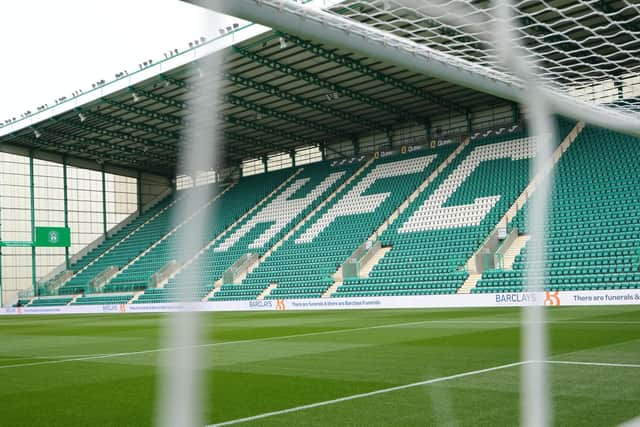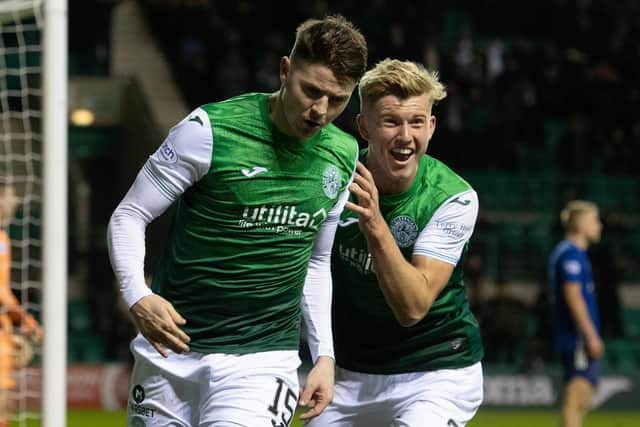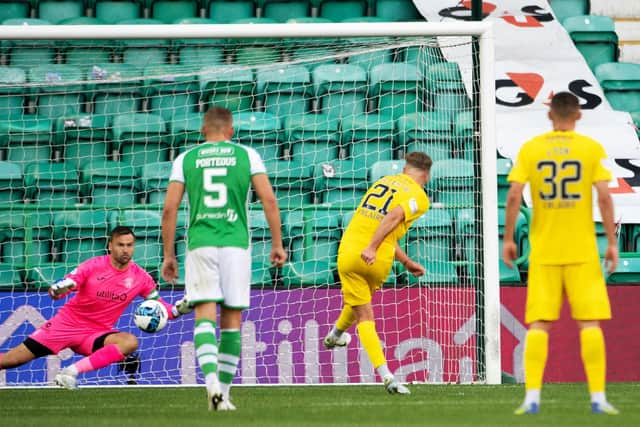Hibs release latest accounts: Overall loss, rise in wages, explanation of downturn
Hibs have recorded an overall loss of almost £4 million after they released their accounts for the year ending June 30, 2023.
The club has revealed that loss before tax was £3.9m compared to £1.5m for the 2022 accounts, with Hibs saying that an absence of European football in the 2022/23 season and not going deep in cup competitions contributed to the downturn in finances. Those factors were partially offset by the sales totalling £3.2m of Josh Doig to Hellas Verona and Kevin Nisbet to Millwall, with sell-on fees inserted for both players. Hibs are also understood to have exceeded their transfer budget in January 2023 in their quest to qualify for European football.
Advertisement
Hide AdAdvertisement
Hide AdTurnover marginally increased from £11.9m to £12.4m, while wages to turnover ratio is now sitting at 81 per cent from 71 per cent. Staff costs now sit at £10.1m, up from £8.5m the previous year. Hibs reported that they have cash balances at June 30, 2023 of £2.1m, down from £5.2m at 30 June 2022.


Hibs have called an AGM for Tuesday, February 27, where an estimated £6m investment from American Bill Foley is expected to be given the green light by shareholders.
In the club’s strategic report, Hibs stated: “The Scottish Professional Football League 2022/2023 campaign began with Lee Johnson taking over the Manager role starting in the Scottish League Cup. As the Club failed to qualify for Europe, the campaign began in the group stages of the Scottish League Cup. Unfortunately, the Club failed to progress from the group stages of the competition, which was disappointing both from a sporting and financial perspective. The Scottish Cup campaign performance also failed to launch, as the Club lost to Heart of Midlothian in the Fourth Round of the competition, the round we entered into the competition.
“Fortunately, the league campaign was more successful than our Cup campaigns, with the club returning to the Top Six of the league and ultimately finishing in 5th place. Due to Celtic winning the Scottish Cup, this league finish earned the club a spot in the 2023/2024 Europa Conference League competition.
"Turnover increased by 4 per cent from the previous year to £12.4m. This increase was primarily due to performance off the pitch, as the prior year included three matches at Hampden as part of deep runs into the cups. The club continued to grow it’s commercial revenue, through new partnership deals as well as upscaling existing sponsorship agreements. Central distributions in the current year decreased. Although we improved our league position from 8th place to 5th, lack of success in the Cup competitions, plus no European competition, drove the central distribution balance to be lower.


“The turnover of the Club also increased due to the Women’s team joining the wider football club as of 1 July 2022. This increased turnover from ticket sales, commercial partnerships, central distribution, and donations related to the women’s team.
On the back of an 8th place finish in the 2021/2022 season, the worst finish from the Club since 2013-2014, the Club board and ownership took the decision to increase spending in order to bolster sporting performance. This investment focused on improving the squad as well as further investment in people and infrastructure at the training centre. Peer clubs also increased investment in the year, as we all looked to secure a third place finish. Securing third place, depending on the Scottish Cup result, provides the respective team with guaranteed group stages of Europe.
"At the start of the season, an opportunity arose to bring back Martin Boyle. The board decided that whilst this spending was unbudgeted and the Club would forgo the outstanding instalment transfer payments, the impact of bringing Boyle back to the team justified the cost. The club invested £2.8m in player registration, this is a significant amount of investing cash flows, and higher than the Club has spent on an annual basis historically.
Advertisement
Hide AdAdvertisement
Hide Ad“In order to grow partnerships and fulfil the requirements of the enhanced hospitality and to accommodate the women’s team, the Club also investing in non-playing staff at both the stadium and the training centre. This increased the average number of commercial and administrative staff during the year from 42 to 44. The increased investment in the playing squad also required increased investment in support staff, with overall player and management numbers increased from 83 in 2022 to 116 in 2023.


“The Club also incorporated the Women’s team into the Club on 1 July 2022, the Women’s team structure was semi-professional so the increase in headcount did not include all full-time players. Overall the staff costs increased by £1.6m compared to the previous year. The important wage to turnover ratio increased by 10%, from 71% in the prior year, to 81% in the current year.
“The club began the year with a ratio more favourable, but with bringing back Martin Boyle along with other transfers late in the Summer window, this ratio grew to a higher percentage than historical trends. The payroll cost also increased due to coaches and players unlocking bonuses upon reaching a European place within the league. Furthermore the Club invested in securing contracts for the very successful development squad. The club endeavours to return the wage to turnover ratio back to the historical trend in the coming years, primarily through increasing turnover and player trading.
“Other operating costs increased to £9.2m for the year compared to £5.6m in the previous year. This is partially explained by an increase in depreciation and amortisation of £0.4m and £0.8m, respectively. The increase in these costs represents the club’s investment in both the infrastructure and playing squad over the past 24 months. The Club also had higher costs associated with hospitality as the club more than doubled the covers on a matchday due to the increased offerings. Additionally, the rates relief experienced by the club until March 2022 ceased, increasing rate costs by 250 per cent. In the previous year, we noted that the power, light, and heating costs increased by 240 per cent, these costs continued to rise by 17%. Additionally, all match-day related costs increased due to supplier price increases to counteract the cost of living crisis; these include security, cleaning, policing, and traffic control.
“Player trading resulted in a gain of £3.2m for the year compared to a gain of £2.1m achieved in the previous year. The current year gain is related to Josh Doig and Kevin Nisbet. At the end of 30 June 2023, approximately £2.5m of this amount was outstanding. The club continues to hold significant sell-on clauses for these sales, as well as Scottish International Ryan Porteous, and therefore feels strong regarding the performance of player trading during the year.
“The Club had cash balances at 30 June 2023 of £2.1m, down from £5.2m at 30 June 2022. The decrease is driven primarily by the cash outflows from operations as well as increased spending on investment activities related to both player registrations and tangible assets. The tangible assets expenditures relate to both revenue producing activities such as completion of the West Stand hospitality fit-out, as well as improvements to the infrastructure at the football club. Installing a hybrid pitch at both Easter Road and at the Training Centre served as one of these projects, as well as improving the flood lighting at the Stadium, which will allow the club reach the UEFA stadium certification that allows for group stage European football. The investing cash proceeds were provided by an increase in financing cashflows from a loan provided by the Club’s ultimate parent company, as well as cash flows from the sale of player registrations.”
